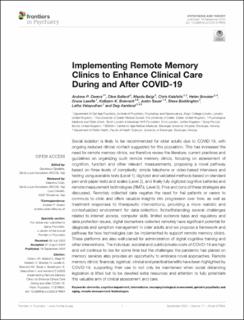| dc.contributor.author | Owens, Andrew P. | |
| dc.contributor.author | Ballard, Clive | |
| dc.contributor.author | Beigi, Mazda | |
| dc.contributor.author | Kalafatis, Chris | |
| dc.contributor.author | Brooker, Helen | |
| dc.contributor.author | Lavelle, Grace | |
| dc.contributor.author | Brønnick, Kolbjørn Kallesten | |
| dc.contributor.author | Sauer, Justin | |
| dc.contributor.author | Boddington, Steve | |
| dc.contributor.author | Velayudhan, Latha | |
| dc.contributor.author | Aarsland, Dag | |
| dc.date.accessioned | 2023-01-10T12:32:28Z | |
| dc.date.available | 2023-01-10T12:32:28Z | |
| dc.date.created | 2020-11-19T15:11:33Z | |
| dc.date.issued | 2020 | |
| dc.identifier.citation | Owens, A. P., Ballard, C., Beigi, M., Kalafatis, C., Brooker, H., Lavelle, G., ... & Aarsland, D. (2020). Implementing remote memory clinics to enhance clinical care during and after COVID-19. Frontiers in psychiatry, 11, 579934. | en_US |
| dc.identifier.issn | 1664-1078 | |
| dc.identifier.uri | https://hdl.handle.net/11250/3042319 | |
| dc.description.abstract | Social isolation is likely to be recommended for older adults due to COVID-19, with ongoing reduced clinical contact suggested for this population. This has increased the need for remote memory clinics, we therefore review the literature, current practices and guidelines on organizing such remote memory clinics, focusing on assessment of cognition, function and other relevant measurements, proposing a novel pathway based on three levels of complexity: simple telephone or video-based interviews and testing using available tests (Level 1), digitized and validated methods based on standard pen-and-paper tests and scales (Level 2), and finally fully digitized cognitive batteries and remote measurement technologies (RMTs, Level 3). Pros and cons of these strategies are discussed. Remotely collected data negates the need for frail patients or carers to commute to clinic and offers valuable insights into progression over time, as well as treatment responses to therapeutic interventions, providing a more realistic and contextualized environment for data-collection. Notwithstanding several challenges related to internet access, computer skills, limited evidence base and regulatory and data protection issues, digital biomarkers collected remotely have significant potential for diagnosis and symptom management in older adults and we propose a framework and pathway for how technologies can be implemented to support remote memory clinics. These platforms are also well-placed for administration of digital cognitive training and other interventions. The individual, societal and public/private costs of COVID-19 are high and will continue to rise for some time but the challenges the pandemic has placed on memory services also provides an opportunity to embrace novel approaches. Remote memory clinics’ financial, logistical, clinical and practical benefits have been highlighted by COVID-19, supporting their use to not only be maintained when social distancing legislation is lifted but to be devoted extra resources and attention to fully potentiate this valuable arm of clinical assessment and care. | en_US |
| dc.language.iso | eng | en_US |
| dc.publisher | Frontiers Media S.A. | en_US |
| dc.rights | Navngivelse 4.0 Internasjonal | * |
| dc.rights.uri | http://creativecommons.org/licenses/by/4.0/deed.no | * |
| dc.title | Implementing Remote Memory Clinics to Enhance Clinical Care During and After COVID-19 | en_US |
| dc.type | Peer reviewed | en_US |
| dc.type | Journal article | en_US |
| dc.description.version | publishedVersion | en_US |
| dc.rights.holder | the authors | en_US |
| dc.subject.nsi | VDP::Medisinske Fag: 700 | en_US |
| dc.source.volume | 11 | en_US |
| dc.source.journal | Frontiers in Psychology | en_US |
| dc.identifier.doi | 10.3389/fpsyt.2020.579934 | |
| dc.identifier.cristin | 1850007 | |
| dc.source.articlenumber | 579934 | en_US |
| cristin.ispublished | true | |
| cristin.fulltext | original | |
| cristin.qualitycode | 2 | |

